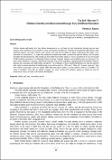| dc.description.abstract | Children develop self-identity, who they believe themselves to be, and begin to form relationships through play and peer
relations which contribute to their emotional, social and cognitive development. Theories of self generally agree that an early
childhood program can foster children’s self- esteem and build the foundation for future relationships with others. From
interviews and observations, 4 to 6 year olds portray their internal lives of self, construct their personal identity, and how these
may affect the learning process. The sample was drawn from 3 pre-school classes in Kenya, consisting of 35 boys and 23 girls
(N=58) Sampled expressions of self through children’s writings, drawings, dialogues and scaffolding tasks are discussed. The
study makes reference to Vygotsky’s theoretical framework of social learning theory, highlighting the links between children’s
learning, play, language, peer relationships and identity. The challenges for early childhood Education and Care are explored
while trying to answer questions of identity facing young children such as, ‘Who am I?’ ‘What will I be when I grow up?’ Data
from children’s expressions show that identity differs from one child to another, and that children’s self can be modified. The
notion of ‘identities’ rather than an ‘identity’ emerged. The study indicates that children’s selves are shaped by local the
environment, values, and each child’s unique development. | en_US |

